Wilhelm Haffner
Wilhelm was born in Jagstfeld Germany on December 29, 1906 and entered the military at the age of 35 on March 6, 1942. Even at his age he was listed as “fit for combat”, and was assigned to 1./Pi.Ers.Btl. 35. Wilhelm remained here until May 11, 1942, when he was assigned to the 260th Infantry Division.
The 260th Infantry Division was attached to Army Group central on the Russian Front, and was a front line combat unit that arrived in Russia immediately after the invasion began. The 260th was almost continuously engaged from July 1941 until the end of the Soviet winter of 1941-42. The division was to remain under the command of Army Group Central for the rest of its existence. It fought in the defensive battles of 1942, in the Rzhev withdrawal the next year, in the battles around Smolensk, and at Gomel. In July 1944, the 260th was surrounded and destroyed near Minsk.
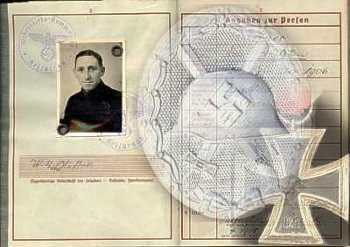
Upon leaving Ers.Btl. 35, Wilhelm was assigned to 2./Inf.Rgt. 470 (attached to the 260th Infantry Division). According to his Wehrpass, he was “Inserted into the Eastern Front”. At that time, Wilhelm’s division was attached to the XII Corp, 4th Army, in Spass-Demensk. Wilhelm remained with the 470th Inf. Rgt. Until July 20, 1942, at which time he transferred to 5. Fahr.Kol. 260th Div. Listed in his Wehrpass are the following dates and locations.
March 7, 1943 – Action at Ressa-Ugra.
March 8, 1943-March 31, 1943 –
Insertion in the line at Spass-Demensk-Dorogobuschestw. Welish.Demensk.
April 1, 1943 - Further action in the East.
Throughout January to August of 1943 the 260th remained with XII Corp, 4th Army, just north of Spass-Demensk and Mogilew. A major Russian assault split the line on the seam of the 260th and its left-hand neighbor, the 268th Infantry Division. This, together with a breakthrough on the southern side of the Spass-Demensk salient, forced the withdrawal from the area. Continued Russian offensives against Army Group Center’s front forced full-scale retreats to the Desna (reached in mid-September). In this withdrawal, the 260th continued to be part of XII corps, 4th Army and fell back towards Roslavi on the northern side of the Roslavi-Spass-Demensk highway. The Desna line was held only briefly before the Germans were compelled to fall back towards the Dneiper.
The 260th now came under control of 41st Panzer corps, 9th Army, and occupied new positions on the Pronya River north of Propoisk (southeast of Mogilev). This line was held until late December 1943, when a fresh Russian offensive aimed at Mogilev forced the abandonment of these positions. Even so, the Soviet offensive ran into stiff German resistance and stalled, falling short of its intended objectives. The division was under the control of the XXIII corps, 4th Army during this strugle. When their section of the front returned to positional warfare, the 260th occupied its new positions to the southeast of Mogilev as part of the XII corps, 4th Army.
On January 13, 1944, Wilhelm was again transferred within the 260th and was reassigned to the 2./ Gren. Rgt. 480, XII Corps, 4th Army. It was with this Rgt. on February 2, 1944, that Wilhelm was grievously wounded. The Russians had been pounding the central front for a year and at great cost had pushed the Germans off their defensive positions. Against the 4th Army front alone, there had been 8 major thrusts, with the last attempt having been warded off in April 1944. The Russians failed to force a break through in the direction of Orsha and Mogilev despite repeated frontal and flanking attacks. It was here, during one of these attacks, that Wilhelm was wounded. For his wounds and actions, Wilhelm received the Silver wound badge and the Iron Cross 2nd Class.
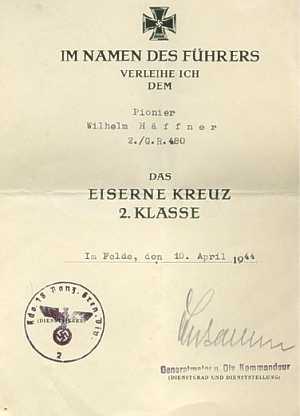 |
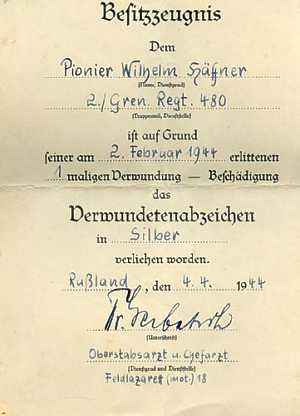
|
Beyond these decorations and his military career, we respectfully share with you a more intimate aspect of his life. Below are a touching series of letters from the Doctors, nurses and a friend at Mobile Field Hospital 18, in Russia. These letters bring to life the heartbreak of war, and give us a brief glimpse into the sacrifices endured by those participated in it.
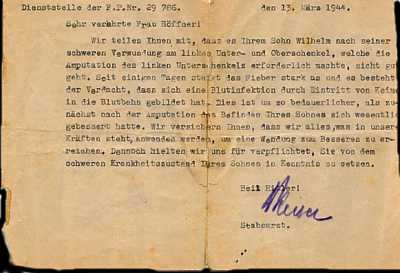
Headquarters, F.P.Nr. 29 786
March 13, 1944
Very honorable Mrs. Haefner!
This is to inform you that your son William, has severe wounds on the left lower and upper limbs which makes amputation of the left lower limb necessary, and is not doing well. For a few days the fever has been strong and we suspect that a blood infection has entered and no blood is available. It will take a long time to tell if your son will get better. We assure you that we will do everything in our power to help him get better. We pledge that we will help your son through his illness.
Heil Hitler!
Keitel
Surgeon
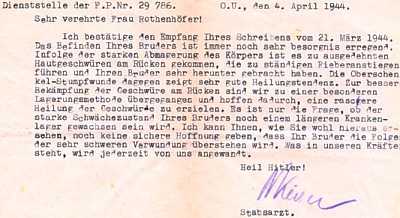
Headquarters, F.P.Nr. 29 786
O.U. April 4, 1944
Very honorable Mrs. Rothenoafer!
I confirm your letter from March 21, 1944. I find that your brother is
still in serious condition following the severe emaciation of his body.
The condition of his back has become severe and the long-standing fever has held
your brother back. The upper limb stump wound is healing quite well.
To better control the severity of the back we are trying another positioning
method and hope to see some healing. It is only the question, can your
brother withstand given his feeble condition an even longer healing period.
I can give you no sure hope that your brother can survive the severe wounds. We
will do what we can.
Heil Hitler!
Keitel
Surgeon
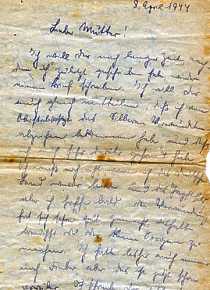 |
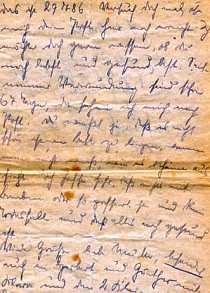 |
April 8, 1944
Dear Mother!
Some time has passed since I wrote last; so it is time to write again. First of all I want to tell you that I received the silver wounded badge. It was presented to me by the senior staff doctor. I was very elated about it.
I don't know when I will be back in Germany and in Jagstfeld, but I am hoping it
is soon. I am healing nicely. Don't worry about that. Until recently I had
fever, but that has normalized now. I am writing you - - -
(CUT OFF, MAYBE: from a military field post office)
....which is 29786. Try it and we will see if your letter will reach me while I am still here. I want to know that you are still alive and that you are still in good health. It has been 67 days since I was wounded - I need mail from home. You know it is not easy to be tied to the bed when one does not know what is going on at home.
I am hoping that you got through the air raid alright and that no one was injured or killed.
Best wishes, dear Mother, also for Herbert and Guenther, Klara and the two
little - - -" (CUT OFF)
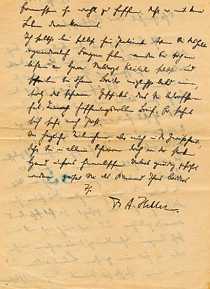 |
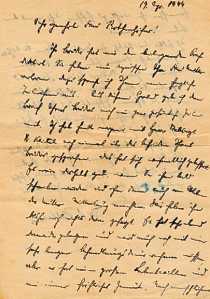 |
April 19, 1944
My dear Mrs.. Rothenhoefer!
Your brother dictated to me the enclosed letter. I like to express my condolences to the loss of your dear Mother in an air raid.
I am adding a few personal words to your brother's letter. This morning I talked to Dr. Keitel about the status of your brother. His condition has improved to the point that you now could write him to tell him about the death of his Mother. We have not told him the sad news yet. He has been in much pain for a long time and will have to expect a prolonged healing process. However, he has a great will to live and has a happy disposition. We can now hope that he will make it back to health.
I am a patient here myself. Should you have additional questions, then you should direct them to Dr. Keitel. Even though fate has been cruel to you, write your brother an uplifting letter. He is in need of mail.
With heartfelt sympathy and with the knowledge that you are lead in all trials by the sure hand of our Heavenly Father, I sign off as your brother's friend
(SIGNATURE)
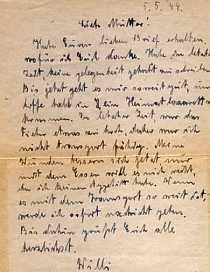
May 5, 44
Dear Mother!
Received your sweet letter. I thank you. Lately I had no opportunity to write. I am doing fine and I hope to be soon transferred to a hospital in the home land. Until now my fever was too high to allow a transfer. My wounds are healing. But my appetite is missing and I eat very little.
I will let you know as soon as I can about my transfer.
Until then greetings to all of you,
Willi.
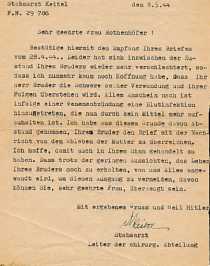
Staff Doctor Keitel, Field Post Office Number 29786, May 8. 44
My dear Mrs. Rothenhoefer!
I acknowledge herewith the receipt of your letter dated Apr 28, 44. Unfortunately, your brother's condition has become so bad that little hope exists that he will recover from his serious wounds. It seems that blood poisoning has occurred which can not be stopped. For this reason I did not give him your letter which contained word about the death of your (HIS) Mother. I hope to have acted according to your wishes. You can be sure that in spite of the hopelessness, we are doing our very best to keep your brother alive.
With devoted greetings and Heil Hitler,
(SIGNATURE)
Staff Doctor and Chief of the Surgery Department
 |
 |
Field Post Office # 29786, Russia, May 9, 1944
Mrs. Klaere Rothenhoefer, nee Haeffner
(ADDRESS)
I am fulfilling my sad duty to inform you that your brother, the Pioneer Wilhem Haeffner, 2. Company, Infantry Regiment 480,died on May 8, 1944, 11:20 p.m. in the local field hospital.
Your brother was seriously wounded on February 2 in front line action south of Mogilev, middle section, by shell fragments. The shell fragments entered and lodged in his left shoulder, left upper arm, left elbow, and left knee.
After initial first aid in the field, your brother was brought the same day to the local field hospital where he was treated with the best help available. But all medical skill and several operations were insufficient. He recuperated somewhat in March to the point that we had hope to keep him alive. But since then his condition worsened and ended with his death in spite of all medical help available.
As most serious injured do, your brother talked little and slept most of the time. We fulfilled all his wishes. Our staff did all they could to make his life as bearable as possible. Eventually, your brother fell into a coma as a result of blood poisoning, he was not aware that his end was near.
Unfortunately, neither did he leave any parting words for his kin. I want to express my deepest sympathy to the loss of your brother. May the knowledge that your brother gave his life for the Greater Germany and its future be soothing for your heartaches. He was interred with military honors in the veterans cemetery here in Mogilev, Pilgrim Street. (EAST OF MINSK, IN TODAY'S BELORUSSIA)
The details about his burial plot and maintenance thereof will be made available to you at a later time through the appropriate military department.
Please acknowledge the receipt of this letter by returning the enclosed post card so that we can send you his personal belongings.
I am expressing my sympathy and remain with a Heil Hitler
(SIGNATURE)
Senior Staff Doctor and Chief Doctor.

"Field post Office # 29786, Russia, May 9, 1944
Notification to the Local Branch Chief The Pioneer Wilhelm Haeffner, 2. Infantry Regiment 480, succumbed on May 8, 1944, 11:20 p.m. in the local field hospital due to serious injuries. He is the brother of Mrs. Klaere Rothenhoefer, nee Haeffner, at (ADDRESS)
The Office of the Chief Doctor
(SIGNATURE)
Senior Chief Doctor
I wish to thank the Tiffin family for making these pages possible. I would
also like to thank Hans F Walters for his patience in translating the text. The
letters presented here are exclusively for the readers of this site; their
reproduction is strictly prohibited.
![]()
© Copyright Wehrmacht-Awards.com LLC |
